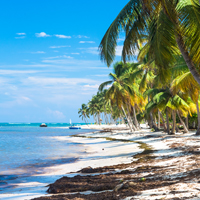Cabarete, the Dominican Republic
Last updated on Jun 09, 2025
Summary: Expats, digital nomads and retirees talk about what it is really like living in Cabarete, Dominican Rep. They offer advice about meeting people, cost of living, finding a home and more.
What do I need to know about living in Cabarete?
When we asked people what advice they would give someone preparing to move to Cabarete, they said:
"Before retiring in Cabarete, Dominican Republic, expats should know that the cost of living is generally lower than in many Western countries, but it can vary depending on lifestyle choices. They should be aware that the official language is Spanish, so learning the language or having a basic understanding can be beneficial. Healthcare in the Dominican Republic is not as advanced as in some Western countries, so expats may want to consider health insurance that covers medical evacuation. The Dominican Republic has a tropical climate, with warm temperatures year-round, but it is also prone to hurricanes. Expats should also know that the Dominican Republic has a different culture and customs, so it's important to be respectful and open to learning about the local way of life. Safety can be a concern in certain areas, so it's important to research and choose a safe neighborhood. The country has a residency program for retirees with a stable income, but the process can be bureaucratic and time-consuming. The Dominican Republic's infrastructure, including roads and internet service, may not be as reliable as in some Western countries. Finally, expats should be aware that while Cabarete is known for its beautiful beaches and water sports, it also has a vibrant nightlife, which may not be suitable for all retirees," said one expat in Cabarete.
 InsideDR Concierge
InsideDR ConciergeGet Quote
Because we've done it and we understand what it’s like to move to the Dominican Republic, our goal is to ensure that you and your family feel secure and supported throughout this new adventure. We’re here to welcome and guide you every step of the way.
 InsideDR Concierge
InsideDR ConciergeBecause we've done it and we understand what it’s like to move to the Dominican Republic, our goal is to ensure that you and your family feel secure and supported throughout this new adventure. We’re here to welcome and guide you every step of the way.
Get Quote
What do I need to know before moving to Cabarete?
When we asked people what advice they would give someone preparing to move to Cabarete, they said:
"Cabarete, Dominican Republic is a popular destination for expats, known for its beautiful beaches, vibrant nightlife, and water sports. Before moving, it's important to understand the local culture, cost of living, and legal requirements. Spanish is the official language of the Dominican Republic, so learning some basic phrases can be beneficial. However, English is widely spoken in tourist areas and by many locals in Cabarete. The cost of living in Cabarete is relatively low compared to many Western countries. However, imported goods can be expensive, so it's advisable to adapt to local products and lifestyle. Healthcare in the Dominican Republic is not as advanced as in some Western countries. While there are some good private hospitals and clinics, it's recommended to have comprehensive health insurance that covers medical evacuation. The Dominican Republic has a tropical climate with high temperatures and humidity throughout the year. It's important to stay hydrated and protect yourself from the sun. The local cuisine is a mix of Spanish, indigenous Taíno, and African influences. It's generally safe to eat at local restaurants, but it's advisable to drink bottled water. Public transportation in the Dominican Republic is not very reliable or safe. Most expats choose to rent or buy a car, but it's important to be aware that driving standards can be poor. The Dominican Republic has a relaxed, laid-back lifestyle. However, it's important to be aware of local customs and etiquette to avoid offending locals. Safety can be a concern in the Dominican Republic, with petty crime being relatively common. It's advisable to take precautions such as not displaying wealth, being aware of your surroundings, and avoiding certain areas at night. The process of obtaining residency in the Dominican Republic can be complex and time-consuming. It's advisable to hire a local lawyer to assist with the process. The Dominican Republic is prone to natural disasters such as hurricanes and earthquakes. It's important to be prepared and have a plan in place in case of emergencies. Finally, it's important to remember that while Cabarete offers a beautiful and exciting lifestyle, it's still a developing country with its own set of challenges. Patience, flexibility, and a sense of adventure will go a long way in making your move a success," wrote a member in Cabarete.
How do I find a place to live in Cabarete?
We asked expats how they chose their neighborhood and found a place to live. They answered:
"Finding a place to live in Cabarete, Dominican Republic involves several steps. First, you need to determine your budget and what type of accommodation you are looking for. This could range from a small apartment to a large villa. Next, you should research the different neighborhoods in Cabarete to find one that suits your lifestyle and preferences. Some people might prefer a quiet area, while others might want to be close to the beach or the town center. Once you have an idea of what you're looking for, you can start your search. There are several online platforms where you can find listings for rentals in Cabarete, such as Airbnb, Booking.com, and local real estate websites. You can also contact local real estate agents who can help you find a place to live. They have extensive knowledge of the local market and can help you find a place that fits your needs and budget. Another option is to visit Cabarete and look for rentals in person. This can be a good way to get a feel for the different neighborhoods and see the properties in person before making a decision. Once you've found a place you like, make sure to thoroughly read the rental agreement before signing. Check the terms and conditions, the duration of the lease, and what is included in the rent. Finally, before moving in, it's a good idea to inspect the property for any damages and make sure everything is in working order. If there are any issues, report them to the landlord or property manager immediately," commented one expat who made the move to Cabarete.
What is a typical expat home or apartment like in Cabarete?
"A typical expat home or apartment in Cabarete, Dominican Republic, is often located near the beach, offering stunning ocean views. These homes are usually spacious, with open floor plans that allow for plenty of natural light. They often feature modern amenities such as air conditioning, high-speed internet, and fully equipped kitchens. Many have private balconies or terraces, perfect for enjoying the tropical climate. The decor often reflects the local culture, with vibrant colors and tropical motifs. Some homes may also have a private pool or access to a community pool. Security is typically a priority, with gated communities being a popular choice among expats. Many of these homes are within walking distance to local shops, restaurants, and other amenities. Despite being fully furnished and equipped with modern amenities, these homes often blend seamlessly with the natural beauty of Cabarete, with lush gardens and palm trees surrounding the properties," said one expat who made the move to Cabarete.
What is the average cost of housing in Cabarete?
If you are thinking about moving to Cabarete, cost of living in probably a key consideration. Expats commented about the cost of housing:
"The average cost of housing in Cabarete, Dominican Republic can vary greatly depending on the type and location of the property. For a one-bedroom apartment in the city center, the monthly rent can be quite affordable. However, larger apartments or houses, especially those in prime locations or with luxury amenities, can be significantly more expensive. If you're looking to buy property, the cost per square meter can also fluctuate based on location and the condition of the property. Overall, while Cabarete can be more affordable than many other popular tourist destinations, the cost of housing can still be quite high, particularly for premium properties," remarked one expat living in Cabarete, the Dominican Republic.
How do I meet people in Cabarete?
When we asked people living in Cabarete about club and activities where newcomers can meet others, they responded:
"Cabarete, Dominican Republic, is a popular destination for expats, and there are numerous clubs and activities they can join to meet people and integrate into the local community. Many expats join sports clubs, particularly those focused on water sports like surfing, kiteboarding, and scuba diving, as Cabarete is renowned for its excellent conditions for these activities. There are also fitness clubs and yoga studios that attract a diverse crowd, including expats looking to stay fit and socialize. For those interested in the arts, there are dance classes, painting workshops, and music groups that offer a chance to learn new skills and meet like-minded individuals. Expats often participate in community service or volunteer work, which is a rewarding way to give back to the local community and make new friends. There are several non-profit organizations in Cabarete that welcome the help of expats, such as education initiatives and environmental conservation projects. Language exchange groups are another popular activity for expats. These groups provide an opportunity to practice Spanish with locals and help them with English, fostering mutual understanding and friendships. In addition to joining clubs and participating in activities, expats meet people in Cabarete through social events and gatherings. Many restaurants and bars host live music nights, trivia contests, and other events that draw a diverse crowd. There are also regular farmers markets, craft fairs, and cultural festivals that provide opportunities to mingle with locals and other expats. Lastly, many expats find that simply being open and friendly in their daily interactions can lead to new connections. Whether it's striking up a conversation with a neighbor, chatting with shopkeepers, or getting to know the staff at their favorite cafe, there are countless opportunities to meet people and feel at home in Cabarete," commented one expat who made the move to Cabarete.
What should I bring when moving to Cabarete?
People living in Cabarete were asked what three things they wish they had brought and three they wish they had left behind. They wrote:
"When moving to Cabarete, Dominican Republic, you should pack lightweight clothing due to the tropical climate, including shorts, t-shirts, and swimwear. Don't forget to pack a few formal outfits for special occasions or dining out. A light jacket or sweater is also recommended for cooler evenings. Sun protection is essential, so pack a wide-brimmed hat, sunglasses, and plenty of high SPF sunscreen. You should also pack a reusable water bottle to stay hydrated in the heat. Bring comfortable walking shoes, as well as sandals or flip-flops for the beach. If you plan on participating in water sports, consider packing your own equipment, such as a snorkel or surfboard. Pack all necessary toiletries, including travel-sized shampoo, conditioner, body wash, and toothpaste. However, keep in mind that these items can also be purchased locally. Don't forget to pack any necessary medications, along with a copy of your prescriptions. It's also a good idea to bring a basic first aid kit. Bring all necessary travel documents, including your passport, driver's license, and any necessary visas or residency paperwork. If you plan on working or studying, pack your laptop, charger, and any other necessary electronics. Remember to bring a power adapter if your devices don't match the local outlets. Lastly, consider packing a few items to make your new place feel like home, such as photos, a favorite book, or a special keepsake," remarked one expat living in Cabarete, the Dominican Republic.
Where should I setup a bank account in Cabarete?
We asked expats in Cabarete what banks they use and there advice about banking. They advised:
"Before retiring in Cabarete, Dominican Republic, expats should know that the cost of living is generally lower than in many Western countries, but it can vary depending on lifestyle. The official language is Spanish, so learning the language can be beneficial, although English is widely spoken in tourist areas. Healthcare in the Dominican Republic is not as advanced as in some Western countries, but there are private clinics and hospitals that offer high-quality care. Expats should consider getting a comprehensive health insurance that covers medical evacuation. The Dominican Republic has a tropical climate with high temperatures and humidity, which might take some time to get used to. Hurricanes can occur between June and November. Cabarete is known for its outdoor activities, especially water sports like windsurfing and kiteboarding. It has a vibrant expat community and is generally considered safe, but like anywhere, crime can be a problem, so it's important to take standard precautions. The country's immigration laws require that foreigners apply for residency if they plan to stay more than two months. It's also important to know that the Dominican Republic has a different culture and pace of life, which some might find slower than what they're used to. Lastly, while the Dominican Republic is developing rapidly, power outages and unreliable internet can still be common, especially in more rural areas," commented one expat who made the move to Cabarete.
Will I be able to find a job in Cabarete?
When we asked people about industries and career opportunities in Cabarete, they reponded:
"Foreigners in Cabarete, Dominican Republic often find employment in the tourism industry, working in roles such as hotel management, tour guiding, and restaurant service. Some also work as instructors in the popular local activities of surfing, kitesurfing, and scuba diving. Others may find work in real estate, helping other expatriates to find and purchase property. There are also opportunities for foreigners to teach English or other languages in local schools or private institutions. Some foreigners may also start their own businesses, such as bars, restaurants, or retail shops catering to tourists and the expatriate community. Additionally, some foreigners work remotely in various fields such as IT, marketing, or writing, taking advantage of Cabarete's lifestyle and climate while maintaining their overseas employment," commented one expat who made the move to Cabarete.
What is life like in Cabarete?
When we asked people living in Cabarete what life is like and how people spend their time, they said:
"Life for expats and digital nomads in Cabarete, Dominican Republic is often described as a tropical paradise with a laid-back lifestyle. The town is known for its friendly locals, vibrant nightlife, and stunning natural beauty, including its world-renowned beaches. Expats and digital nomads enjoy a low cost of living, with affordable housing and food. The town is also known for its active lifestyle, with plenty of opportunities for water sports like surfing and kiteboarding. Despite being a small town, Cabarete has a strong expat community and a good number of cafes and co-working spaces, making it an ideal place for digital nomads. The internet connection is generally reliable, which is crucial for remote work. English is widely spoken in Cabarete, making it easier for expats to communicate and integrate. However, it's worth noting that while the healthcare system in the Dominican Republic is improving, it may not be up to the standards that some expats are used to. Also, while crime rates are relatively low in Cabarete compared to other parts of the country, petty crime like theft can be an issue, so it's important to take precautions. Overall, life in Cabarete offers a unique blend of Caribbean charm, natural beauty, and modern amenities, making it a popular choice among expats and digital nomads," remarked one expat who made the move to Cabarete.

Abreu & Associates is a law firm practicing exclusively in the area of the Dominican Republic Immigration process and Nationality law. The firm serves as a trusted advisor in all practice areas of immigration law including Visa, Provisional Residency, Permanent Residency, Renewals, Investment Management, Dominican and American Citizenship, and Dominican Driver's License.
Click connect to have our partner contact you via e-mail and/or phone.

Abreu & Associates is a law firm practicing exclusively in the area of the Dominican Republic Immigration process and Nationality law. The firm serves as a trusted advisor in all practice areas of immigration law including Visa, Provisional Residency, Permanent Residency, Renewals, Investment Management, Dominican and American Citizenship, and Dominican Driver's License.
Click connect to have our partner contact you via e-mail and/or phone.
What do expats in Cabarete appreciate most about the local culture?
"Expats in Cabarete, Dominican Republic often appreciate the warm and welcoming nature of the local people. They are known for their friendliness and hospitality, making newcomers feel at home. The local culture is vibrant and lively, with a love for music and dance, particularly merengue and bachata, which is deeply appreciated by expats. Expats also appreciate the laid-back lifestyle and slower pace of life in Cabarete, which is a refreshing change from the hustle and bustle of city life. The local cuisine is another aspect that expats enjoy, with a variety of fresh seafood, tropical fruits, and traditional dishes like sancocho and mofongo. The strong sense of community in Cabarete is also appreciated by expats, where locals and foreigners alike come together to celebrate festivals and events. Lastly, the natural beauty of Cabarete, with its stunning beaches and lush landscapes, is something that expats deeply appreciate about the local culture," wrote a member in Cabarete.
What do expats find most challenging?
"Expats in Cabarete, Dominican Republic often find the language barrier to be the most challenging aspect of the local culture, as Spanish is the primary language spoken and not everyone is fluent in English. The laid-back, "island time" mentality can also be a challenge for those accustomed to punctuality and strict schedules. The difference in living standards and infrastructure, such as frequent power outages and unreliable internet, can be difficult to adjust to. Additionally, navigating the local bureaucracy and legal system, especially for property ownership or starting a business, can be complex and time-consuming. Lastly, some expats may struggle with cultural differences in social norms and etiquette, such as attitudes towards personal space, noise levels, and customer service," wrote a member in Cabarete.
Is there a lot of crime in Cabarete?
We asked people if there is a lot of crime. They answered:
"Like any other tourist destination, Cabarete in the Dominican Republic has its share of crime. However, it is generally considered safe for tourists. Most of the crimes reported are petty crimes like pickpocketing or bag snatching, especially in crowded areas. Violent crimes are relatively rare, but they do occur occasionally. Tourists are advised to take standard precautions such as not displaying expensive jewelry or electronics, avoiding isolated areas, especially at night, and being aware of their surroundings at all times. The local police force is present and responsive to any reported incidents. Despite these issues, many tourists visit Cabarete every year and enjoy their stay without any problems," commented one expat who made the move to Cabarete.
Is there a lot of diversity? Are people in Cabarete accepting of differences?
"Cabarete, Dominican Republic, is known for its cultural diversity, with a mix of locals and expatriates from around the world. This beach town is home to people from various backgrounds, cultures, and nationalities, creating a vibrant and diverse community. The people of Cabarete are generally accepting of differences, embracing the multicultural environment. This acceptance is reflected in the harmonious coexistence of different cultures and the warm, welcoming attitude towards visitors and new residents. However, like any place, individual experiences may vary," commented one expat who made the move to Cabarete.
 InsideDR Concierge
InsideDR ConciergeGet Quote
Because we've done it and we understand what it’s like to move to the Dominican Republic, our goal is to ensure that you and your family feel secure and supported throughout this new adventure. We’re here to welcome and guide you every step of the way.
 InsideDR Concierge
InsideDR ConciergeBecause we've done it and we understand what it’s like to move to the Dominican Republic, our goal is to ensure that you and your family feel secure and supported throughout this new adventure. We’re here to welcome and guide you every step of the way.
Get Quote
What are the schools in Cabarete like?
"1. The International School of Sosua (ISS): Located near Cabarete, ISS is a private, non-profit institution that offers a U.S. style education to students from pre-kindergarten to grade 12. The school is accredited by the New England Association of Schools and Colleges and offers a bilingual program in English and Spanish. The curriculum includes a strong emphasis on science, technology, engineering, arts, and mathematics. [Website](http://www.issosua.com/) 2. Garden Kids International School: This is a bilingual school located in Cabarete that offers education from pre-kindergarten to grade 12. The school follows a U.S. curriculum and provides a multicultural environment with students from various nationalities. The school emphasizes on holistic development of students and encourages participation in extracurricular activities. [Website](http://www.gardenkids.edu.do/) 3. 3 Mariposas Montessori: This school offers a bilingual Montessori education to children aged 3 months to 6 years. The school aims to provide a nurturing and stimulating environment where children can grow and learn at their own pace. The curriculum includes practical life skills, sensorial activities, language, math, and cultural studies. [Website](https://3mariposasmontessori.com/) 4. Dominican Republic Education and Mentoring (DREAM) Project: While not a traditional school, the DREAM Project is a non-profit organization that provides quality education to children and young adults in the Cabarete area. They offer a variety of programs including early childhood education, high quality primary education, holistic youth development, and arts and culture. [Website](https://www.dominicandream.org/) 5. E. Leclerc French School: This is a French international school located in Sosua, near Cabarete. The school offers a French curriculum from pre-kindergarten to grade 12 and is accredited by the French Ministry of Education. The school also offers Spanish and English language classes. [Website](http://www.ecoleleclerc.com/)," remarked one parent with kids at in Cabarete.
About the Author
 Betsy Burlingame is the Founder and President of Expat Exchange and is one of the Founders of Digital Nomad Exchange. She launched Expat Exchange in 1997 as her Master's thesis project at NYU. Prior to Expat Exchange, Betsy worked at AT&T in International
and Mass Market Marketing. She graduated from Ohio Wesleyan University
with a BA in International Business and German.
Betsy Burlingame is the Founder and President of Expat Exchange and is one of the Founders of Digital Nomad Exchange. She launched Expat Exchange in 1997 as her Master's thesis project at NYU. Prior to Expat Exchange, Betsy worked at AT&T in International
and Mass Market Marketing. She graduated from Ohio Wesleyan University
with a BA in International Business and German.
Some of Betsy's articles include 12 Best Places to Live in Portugal, 7 Best Places to Live in Panama and 12 Things to Know Before Moving to the Dominican Republic. Betsy loves to travel and spend time with her family. Connect with Betsy on LinkedIn.



